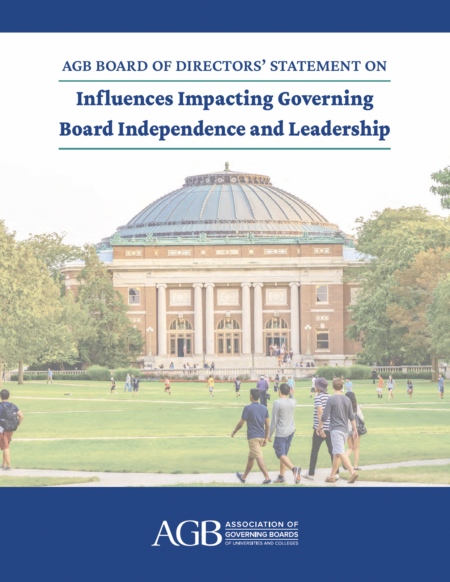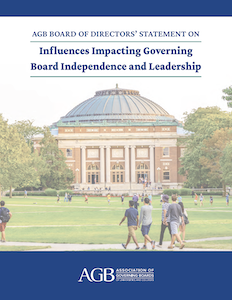
This tool is an excerpt from the AGB Board of Directors’ Statement on Influences Impacting Governing Board Independence and Leadership (Washington, D.C.: AGB, 2023), 4-8.
Too often, boards delay action until the threat becomes a crisis. But strong boards do not just resist interference; they proactively affirm their principles and prepare to defend them.
Recognizing political intrusion is only the first step. The true test of board leadership lies in what comes next.
In a time when external pressures can erode institutional values and disrupt mission-driven decision-making, boards must not only stand firm; they must act. Upholding institutional autonomy, freedom of speech, and academic freedom is not just a philosophical stance. It is a fiduciary imperative. It requires deliberate choices, clear policies, and public commitments that reinforce the board’s role as a steward of independent, mission-centered governance.
Too often, boards delay action until the threat becomes a crisis. But strong boards do not just resist interference; they proactively affirm their principles and prepare to defend them. That includes adopting formal positions, aligning institutional policy, and joining forces with like-minded peers to elevate a shared commitment to higher education as a public good.
Now is the time for boards to move with clarity and purpose—to take visible, values-based steps that signal not just where they stand, but what they stand for.
Recommendations from the AGB Board of Directors’ Statement on Influences Impacting Governing Board Independence and Leadership
Governing boards must balance their responsiveness to valuable ideas and input while safeguarding their independence. To ensure this practice, it is AGB’s recommendation that all governing boards continue to uphold the following principles outlined in the 2012 statement:
» Preserve institutional independence and autonomy.
» Demonstrate board independence to govern as established in charter, state law, or constitution.
» Keep academic freedom central and be the standard bearer for the due-process protection of faculty, staff, and students.
» Assure institutional accountability to the public interest.
While these four principles are still bedrock, governing boards need fresh guidance on how to apply them currently.
To implement those principles, AGB offers the following recommendations—practices that can help governing boards be prepared to make appropriate fiduciary decisions even when doing so may be difficult.
Recommendations
Governing boards must balance their responsiveness to valuable ideas and input while safeguarding their independence. To ensure this practice, it is AGB’s recommendation that all governing boards continue to uphold the following principles outlined in the 2012 statement:
- Preserve institutional independence and autonomy.
- Demonstrate board independence to govern as established in charter, state law, or constitution.
- Keep academic freedom central and be the standard bearer for the due-process protection of faculty, staff, and students.
- Assure institutional accountability to the public interest.
While these four principles are still bedrock, governing boards need fresh guidance on how to apply them currently.
To implement those principles, AGB offers the following recommendations—practices that can help governing boards be prepared to make appropriate fiduciary decisions even when doing so may be difficult.
1. Engage in thoughtful discussion, decision-making, and policymaking to build shared understanding of the core concepts and values that underlie exemplary governance and the board’s work, while continuing to have meaningful learning experiences together about foundational principles, not just current campus matters.
One way to begin such discussions could be reinforcing that governing boards are accountable for:†
- Protecting the mission. Assessing and evolving the mission of the institution guides a governing board’s work and how it addresses its responsibilities. Governing boards have a fiduciary responsibility to advance the institution’s mission and to promote its integrity and quality. They also have a responsibility to reexamine and reshape that mission as needs and conditions may require. Foundation boards should be guided by their fiduciary obligations to honor donor intent, serve as prudent stewards of charitable assets, and advance the mission priorities of the institution.
- Safeguarding the transcendent values that guide and shape American higher education. Among those abiding values are self-regulation and autonomy, academic freedom and due process, shared governance, educational quality, transparency, and fiscal integrity. Governing boards are responsible for protecting such values not only on behalf of their own institutions and foundations but also for American higher education in general. In the case of church-affiliated institutions, guiding values may also include certain tenets of the relevant faith community.
- Reinforcing the public’s interest and trust. The American people entrust control of higher education institutions to citizen-led boards and to the independent judgment of their members, rather than to senior public officials or bureaucracies. All governing boards are accountable for the achievement of public purposes. Thus, governing boards incur a special duty to preserve and enhance the institution for future generations. Governing boards of independent colleges are accountable not only to the sources of their founding authority, but also to a government-issued statement of authority, such as a charter that describes some of the basic public expectations for the institution. For those boards whose members are elected by the public or appointed by a governor or legislature (in whole or in part) authority derives from, and accountability pertains to, relevant state laws, charters, or other governing documents.
- Enforcing the legitimate and relevant interests that various constituencies represent. These include alumni, community leaders, donors, faculty, parents, staff, students, local government officials, unions, labor groups, among others. A governing board must exercise its best judgment to accommodate such interests, but it is the board that makes the ultimate decision in light of the institution’s mission, values, strategic priorities, and the law. The board bears ultimate responsibility for weighing conflicting claims of interested parties and the long-term benefits and priorities of the institution. Foundation boards should collaborate closely with institution leaders when considering gifts that may not advance the mission, values, or priorities of the institution.
Further, AGB’s principles for exemplary governance state that governing boards should:
- Focus on what matters most, including success for all students and the fulfillment of the institution’s or foundation’s mission over the long term.
- Carry out the fiduciary duties of care, loyalty, and obedience.
- Protect academic freedom, board independence, and institutional autonomy.
- Understand and support shared governance.
- Engage in thoughtful discussion and decision-making based on sound information and collective wisdom.
- Establish an effective partnership with the chief executive officer.
- Document consensus and build on board learning experiences by maintaining a written, regularly updated inventory of policies and procedures for board governance.
In general, each board should apply a shared understanding of such core concepts as: the best interests of the institution; institutional autonomy; academic freedom and due process; shared governance; board independence; the fiduciary duties of care, loyalty, and obedience; and board accountability. It should continually educate its members on all aspects of their fiduciary responsibilities, with a focus on key principles and how best to apply those principles.
2. Make structural and procedural changes that reinforce the governing board’s fiduciary duties and authority.
- Dedicate time at every meeting to purposeful, ongoing education and discussion about board governance. Discuss how AGB’s Principles of Trusteeship (AGB, 2021) applies to carrying out one’s fiduciary duties.
- Ensure that new board members and their nominating or appointing authorities understand their fiduciary duties.
- Include a session on identifying and addressing external and internal influences in new-board-member orientation programs. In addition, provide continuing education on the topic for all board members, even seasoned ones.
- Determine the board’s options for identifying and navigating efforts by influencers that may conflict with board-approved strategic priorities.
3. Listen, learn, and lead. Recognize that all governing boards and their organizations need to adapt and improve. Listen with open minds to constituents’ concerns and suggestions.
- Support and encourage discussion of diverse viewpoints to expand mindsets, sharpen thinking, and make well-informed decisions.
- Listen with open minds to citizens and officials from domestic and foreign entities. Consider whether their concerns are well-informed, legitimate, and merit board discussion and potential changes to institutional policies and practices.
- Build important relationships by regularly and appropriately communicating with key constituencies through coordinated efforts throughout the year, not only when a problem occurs or during a particular cycle of events.
- Consider and discuss stakeholders’ ideas, including whether the input merits potential changes to policies and practices.
- Establish policies and practices that discourage individuals or groups from going over the heads of senior administrators and going uninvited to the board directly with their grievances and concerns. Boards must be careful to avoid being used in this way, as it can create legal and other challenges.
4. Recognize that fiduciary duty belongs to each member of the board and to board actions.
- As stated in AGB’s Principles of Trusteeship, each board member should think independently and act collectively on what matters most to support the long-term vitality of a college, university, or related foundation. Governing boards, reflecting the aggregate actions of board members, are responsible for advancing the institution’s or foundation’s best interests, as is each member of the governing board.
- Understand that governing board members have no authority as individuals; authority rests in the formal, collective actions of the board as a whole—the board’s collective judgment. Individual board members’ courage to make hard decisions will come from understanding their profound governance responsibilities and accountability for supporting the institution’s or foundation’s mission.
5. Address inappropriate influences that interfere with the governing board’s independence, authority, or fiduciary commitment to the long-term success of the institution or foundation.
- Prepare to address, in open meetings with the public, if necessary, influences that are not aligned with the governing board’s aggregate belief about the institution’s or foundation’s long-term interests, so as to reinforce its mission and strategic priorities. Collective wisdom requires candid discussion.
- Consider a phased approach or scenario planning when the potential for confrontation exists. Specifically, ensure the chief executive officer and board chair understand the potential challenges, and clarify messaging with influencers. The board chair speaks on behalf of the board, and the chief executive officer speaks on behalf of the institution, system, or related foundation.
† AGB Board of Directors’ Statement on Board Accountability (2015), https://agb.org/agb-statements/agb-statement-on-board-accountability/.



